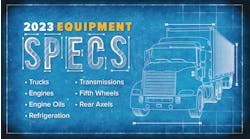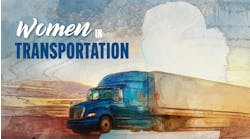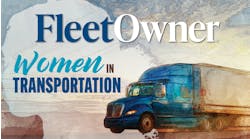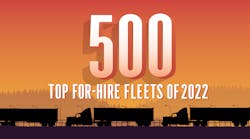Supply chain snarls began dominating headlines in the second half of 2021 and continue to do so, with the industry still reeling from the effects at the start of 2022. And many—if not all—of the trucking companies on this year’s FleetOwner 500 For-Hire list have not only had to endure slow equipment deliveries and widespread labor shortages, but they had to continue to serve their customers and remain a critical constant within the economy.
While uncertainties still loom, the freight volume outlook remains strong and some of the top for-hire companies on this year’s list have taken the next steps to set themselves up for success in the coming year. For example, executives from Knight-Swift Transportation Holdings Inc.—ranked No. 4 on the 2022 list—are on a path toward building a national less-than-truckload business. In 2021, Phoenix-based Knight-Swift acquired the parent company for Midwest Motor Express Inc. and Midnite Express Inc. for $150 million in cash.
See more: Trucking analysts project 'steady' improvements for 2022
Earlier in 2021, Knight-Swift paid more than $1.3 billion for AAA Cooper Transportation, a move that gave it a less-than-truckload (LTL) network in the Southeast and Midwest. Knight-Swift also announced plans in October 2021 to ramp up intermodal capacity.
J.B. Hunt, which ranks No. 5 on this year’s list, recognized strong demand across its business in 2021. But like others in the segment, the company faced labor shortages and equipment restraints head-on and had to slightly pivot its business operations.
Also of note from 2021 are the companies that didn't make it. After 96 years in business, Waco, Texas-based LTL carrier Central Freight Lines ceased operations in December. According to data from the Federal Motor Carrier Safety Administration (FMCSA), the carrier employed 1,325 drivers and had 1,602 power units. Central Freight Lines ranked No. 80 on the 2021 FleetOwner 500 For-Hire list.
Even more telling is the number of new entrants coming into the for-hire segment. According to FTR Transportation Intelligence data, in 2021, FMCSA authorized nearly 110,000 new for-hire trucking companies. That is 85% more than what the segment saw in 2020 and 150% more than 2018 and 2019, Avery Vise, FTR’s VP of trucking, noted during a January State of Freight discussion.
“Most of these new carriers were probably leased owner-operators who struck out on their own and got their own authority,” Vise explained. “But some number of these were company drivers buying trucks and getting their own authority—that’s part of what’s going on with the used truck market in terms of supply and pricing.”
Preliminary used Class 8 retail volumes (same-dealer sales) grew 4% month-over-month and ended 2021 with a 6% year-to-date increase, despite dropping 30% year-over-year in December, according to data published by ACT Research.
As in previous years, FleetOwner has compiled its annual for-hire list, which includes fleets in the U.S. and Canada. Based on the latest FMCSA data (as of December 2020), 373,238 for-hire carriers are operating in the U.S. and north of the border.
The 2022 FleetOwner 500 For-Hire rankings are based on total power units operated by a fleet. A breakdown by tractors and trucks is provided, and while they are not a factor in the rankings, trailer numbers are also offered.
The information for the top 500 for-hire list is collected by FleetSeek from a database using several public and proprietary sources that are constantly being updated. Those sources include parent companies, subsidiaries, and free-standing fleets; data from FMCSA's Safety and Fitness Electronic Records (SAFER) System; calling and emailing fleets; news articles; and annual reports.
The listed fleets also are divided into a variety of operating categories, including package, general freight, household goods, tank trucks, heavy hauling, building materials, motor vehicles, petroleum products, bulk commodities, refrigerated solids, and agricultural commodities.









